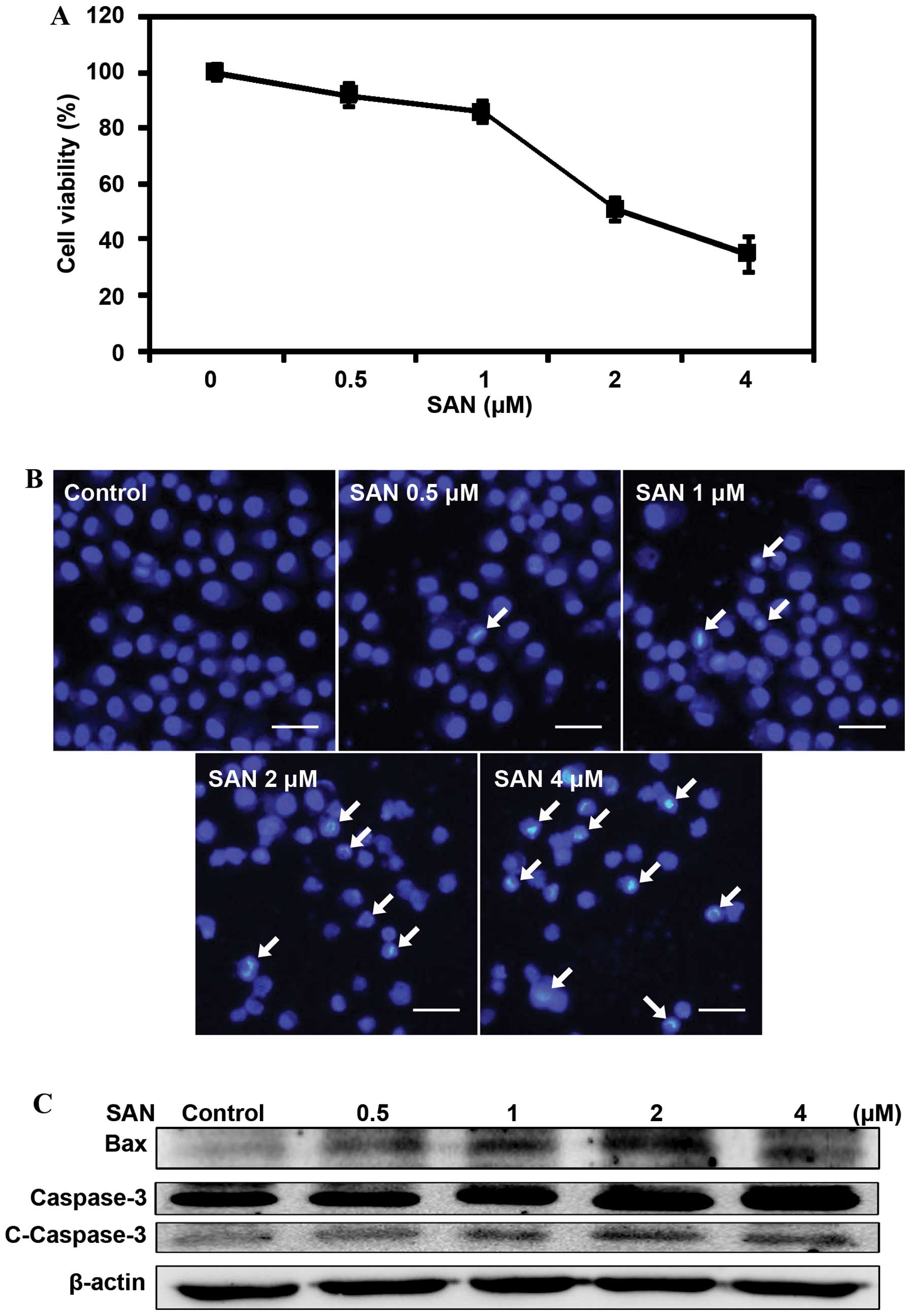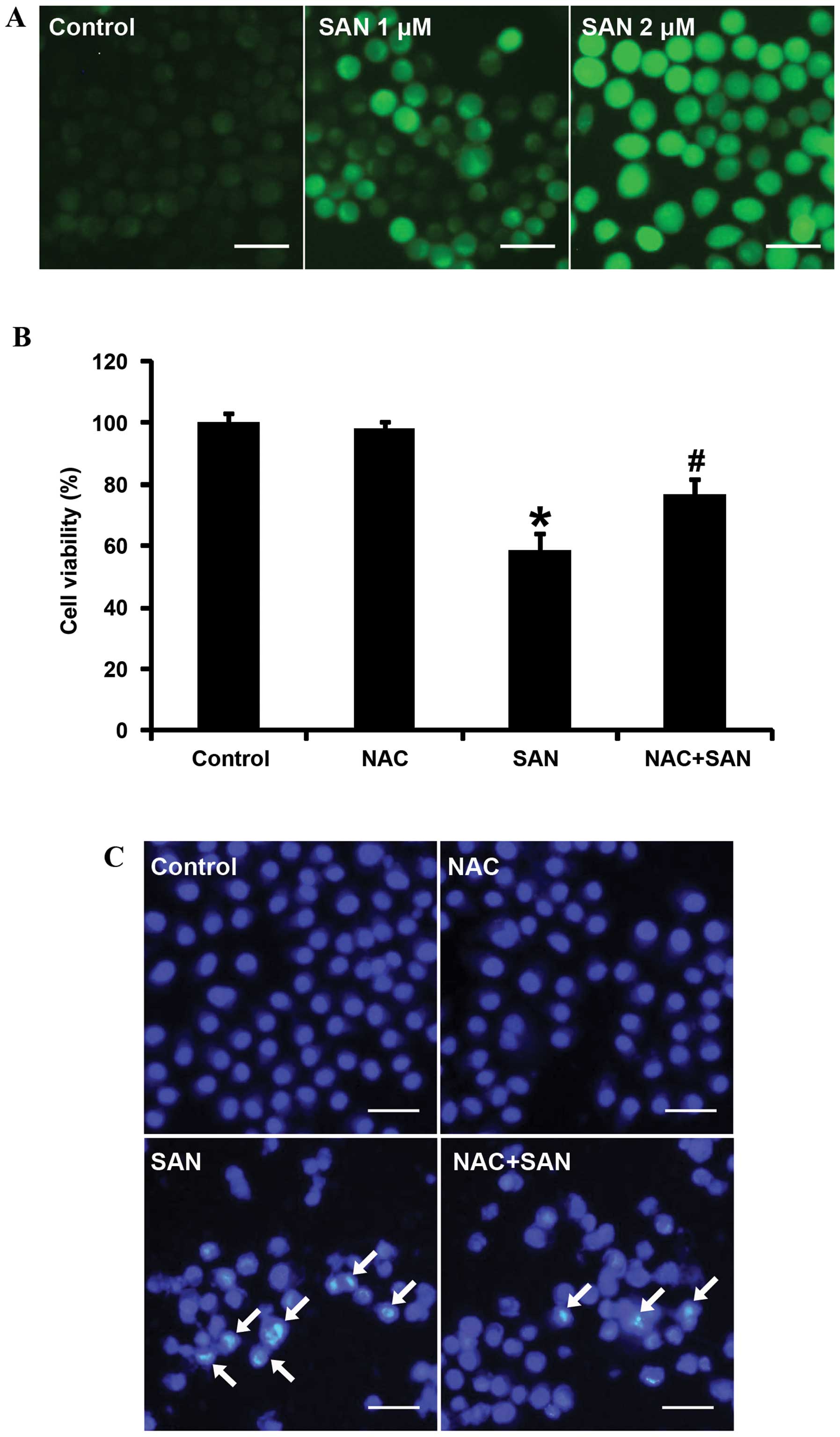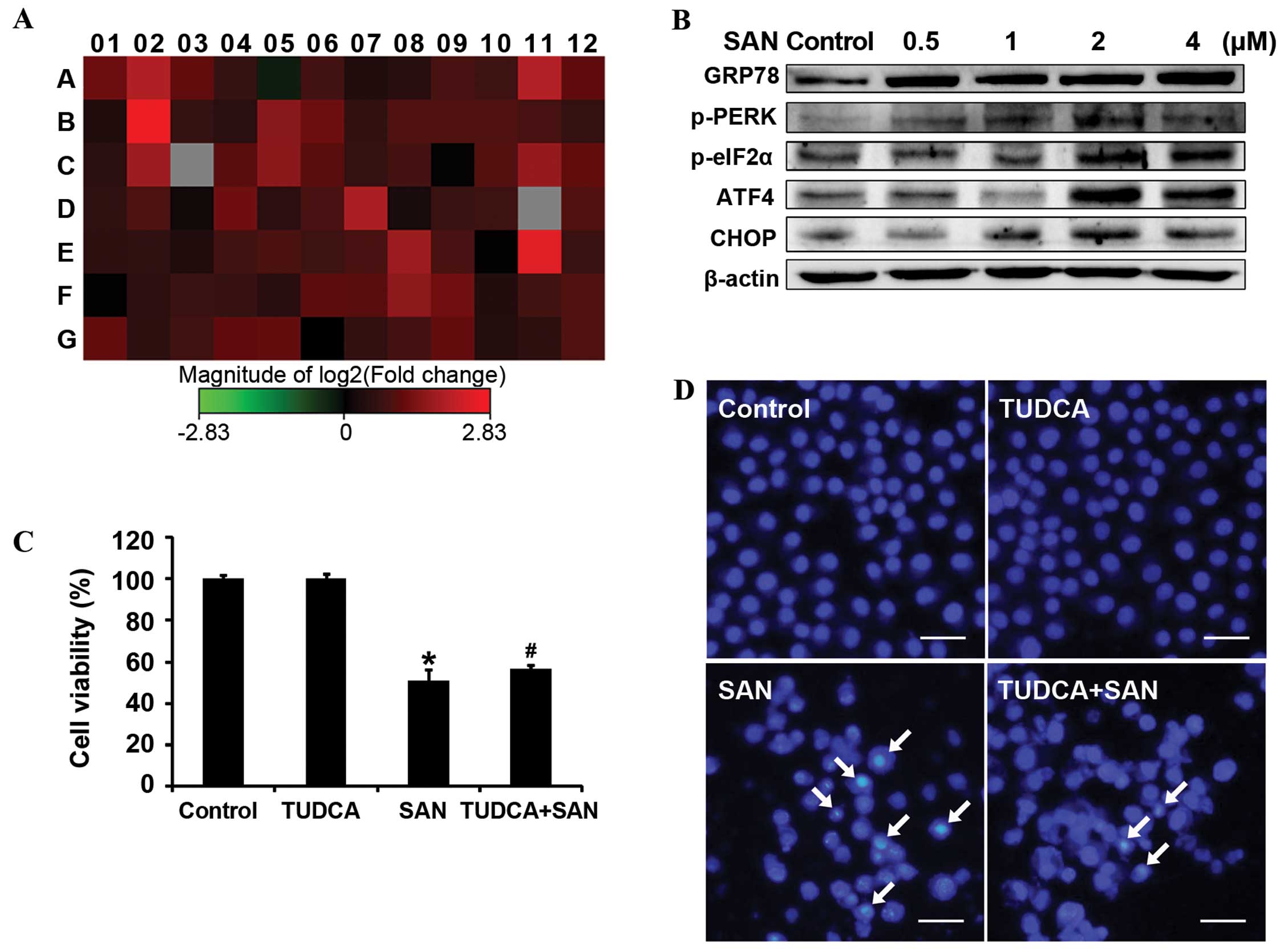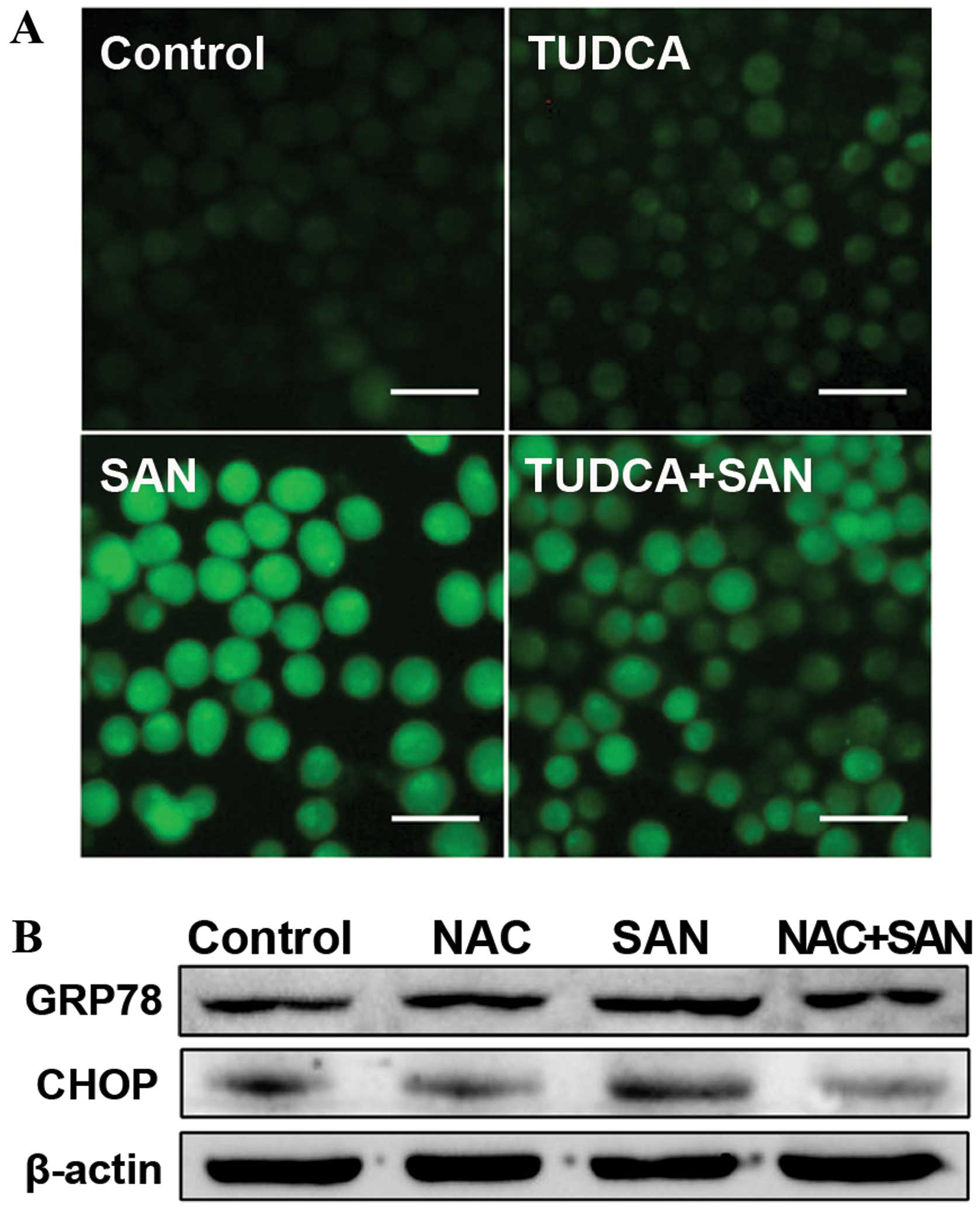|
1
|
Jemal A, Bray F, Center MM, Ferlay J, Ward
E and Forman D: Global cancer statistics. CA Cancer J Clin.
61:69–90. 2011. View Article : Google Scholar : PubMed/NCBI
|
|
2
|
Klastersky J and Awada A: Milestones in
the use of chemotherapy for the management of non-small cell lung
cancer (NSCLC). Crit Rev Oncol Hematol. 81:49–57. 2012.
|
|
3
|
Wang G, Reed E and Li QQ: Molecular basis
of cellular response to cisplatin chemotherapy in non-small cell
lung cancer (Review). Oncol Rep. 12:955–965. 2004.Review.
PubMed/NCBI
|
|
4
|
de Weger VA, Beijnen JH and Schellens JHM:
Cellular and clinical pharmacology of the taxanes docetaxel and
paclitaxel - a review. Anticancer Drugs. 25:488–494. 2014.
View Article : Google Scholar : PubMed/NCBI
|
|
5
|
Wang L, Wei D, Han X, Zhang W, Fan C,
Zhang J, Mo C, Yang M, Li J, Wang Z, et al: The combinational
effect of vincristine and berberine on growth inhibition and
apoptosis induction in hepatoma cells. J Cell Biochem. 115:721–730.
2014. View Article : Google Scholar
|
|
6
|
Sun M, Lou W, Chun JY, Cho DS, Nadiminty
N, Evans CP, Chen J, Yue J, Zhou Q and Gao AC: Sanguinarine
suppresses prostate tumor growth and inhibits survivin expression.
Genes Cancer. 1:283–292. 2010. View Article : Google Scholar
|
|
7
|
Godowski KC: Antimicrobial action of
sanguinarine. J Clin Dent. 1:96–101. 1989.PubMed/NCBI
|
|
8
|
Eisenberg AD, Young DA, Fan-Hsu J and
Spitz LM: Interactions of sanguinarine and zinc on oral
streptococci and Actinomyces species. Caries Res. 25:185–190. 1991.
View Article : Google Scholar : PubMed/NCBI
|
|
9
|
Chaturvedi MM, Kumar A, Darnay BG, Chainy
GB, Agarwal S and Aggarwal BB: Sanguinarine (pseudochelerythrine)
is a potent inhibitor of NF-κB activation, IκBα phosphorylation,
and degradation. J Biol Chem. 272:30129–30134. 1997. View Article : Google Scholar : PubMed/NCBI
|
|
10
|
Adhami VM, Aziz MH, Reagan-Shaw SR, Nihal
M, Mukhtar H and Ahmad N: Sanguinarine causes cell cycle blockade
and apoptosis of human prostate carcinoma cells via modulation of
cyclin kinase inhibitor-cyclin-cyclin-dependent kinase machinery.
Mol Cancer Ther. 3:933–940. 2004.PubMed/NCBI
|
|
11
|
Park SY, Jin ML, Kim YH, Lee S-J and Park
G: Sanguinarine inhibits invasiveness and the MMP-9 and COX-2
expression in TPA-induced breast cancer cells by inducing HO-1
expression. Oncol Rep. 31:497–504. 2014.
|
|
12
|
Xu JY, Meng QH, Chong Y, Jiao Y, Zhao L,
Rosen EM and Fan S: Sanguinarine inhibits growth of human cervical
cancer cells through the induction of apoptosis. Oncol Rep.
28:2264–2270. 2012.PubMed/NCBI
|
|
13
|
Park H, Bergeron E, Senta H, Guillemette
K, Beauvais S, Blouin R, Sirois J and Faucheux N: Sanguinarine
induces apoptosis of human osteosarcoma cells through the extrinsic
and intrinsic pathways. Biochem Biophys Res Commun. 399:446–451.
2010. View Article : Google Scholar : PubMed/NCBI
|
|
14
|
Jang BC, Park JG, Song DK, Baek WK, Yoo
SK, Jung KH, Park GY, Lee TY and Suh SI: Sanguinarine induces
apoptosis in A549 human lung cancer cells primarily via cellular
glutathione depletion. Toxicol In Vitro. 23:281–287. 2009.
View Article : Google Scholar : PubMed/NCBI
|
|
15
|
Martínez-Reyes I and Cuezva JM: The
H(+)-ATP synthase: A gate to ROS-mediated cell death or cell
survival. Biochim Biophys Acta. 1837:1099–1112. 2014. View Article : Google Scholar : PubMed/NCBI
|
|
16
|
Ding Y, Zhu W, Sun R, Yuan G, Zhang D, Fan
Y and Sun J: Diphenylene iodonium interferes with cell cycle
progression and induces apoptosis by modulating NAD(P)H
oxidase/ROS/cell cycle regulatory pathways in Burkitt’s lymphoma
cells. Oncol Rep. 33:1434–1442. 2015.PubMed/NCBI
|
|
17
|
Ma J, Yang J, Wang C, Zhang N, Dong Y,
Wang C, Wang Y and Lin X: Emodin augments cisplatin cytotoxicity in
platinum-resistant ovarian cancer cells via ROS-dependent MRP1
downregulation. BioMed Res Int. 2014:1076712014. View Article : Google Scholar
|
|
18
|
Lim YJ, Choi JA, Lee JH, Choi CH, Kim HJ
and Song CH: Mycobacterium tuberculosis 38-kDa antigen induces
endoplasmic reticulum stress-mediated apoptosis via toll-like
receptor 2/4. Apoptosis. 20:358–370. 2014. View Article : Google Scholar : PubMed/NCBI
|
|
19
|
Sanchez-Lopez E, Zimmerman T, Gomez del
Pulgar T, Moyer MP, Lacal Sanjuan JC and Cebrian A: Choline kinase
inhibition induces exacerbated endoplasmic reticulum stress and
triggers apoptosis via CHOP in cancer cells. Cell Death Dis.
4:e9332013. View Article : Google Scholar : PubMed/NCBI
|
|
20
|
Min KJ, Jung KJ and Kwon TK: Carnosic acid
induces apoptosis through reactive oxygen species-mediated
endoplasmic reticulum stress induction in human renal carcinoma
Caki cells. J Cancer Prev. 19:170–178. 2014. View Article : Google Scholar : PubMed/NCBI
|
|
21
|
Yang X, Xiang X, Xia M, Su J, Wu Y, Shen
L, Xu Y and Sun L: Inhibition of JNK3 promotes apoptosis induced by
BH3 mimetic S1 in chemoresistant human ovarian cancer cells. Anat
Rec. 298:386–395. 2015. View
Article : Google Scholar
|
|
22
|
Malhotra JD and Kaufman RJ: Endoplasmic
reticulum stress and oxidative stress: a vicious cycle or a
double-edged sword? Antioxid Redox Signal. 9:2277–2293. 2007.
View Article : Google Scholar : PubMed/NCBI
|
|
23
|
Song B, Scheuner D, Ron D, Pennathur S and
Kaufman RJ: Chop deletion reduces oxidative stress, improves β cell
function, and promotes cell survival in multiple mouse models of
diabetes. J Clin Invest. 118:3378–3389. 2008. View Article : Google Scholar : PubMed/NCBI
|
|
24
|
Boussabbeh M, Salem IB, Prola A, Guilbert
A, Bacha H, Abid-Essefi S and Lemaire C: Patulin induces apoptosis
through ROS-mediated endoplasmic reticulum stress pathway. Toxicol
Sci. 144:328–337. 2015. View Article : Google Scholar : PubMed/NCBI
|
|
25
|
Muchowicz A, Firczuk M, Wachowska M,
Kujawa M, Jankowska-Steifer E, Gabrysiak M, Pilch Z, Kłossowski S,
Ostaszewski R and Golab J: SK053 triggers tumor cell apoptosis by
oxidative stress-mediated endoplasmic reticulum stress. Biochem
Pharmacol. 93:418–427. 2015. View Article : Google Scholar : PubMed/NCBI
|
|
26
|
He PX, Zhang J, Che YS, He QJ, Chen Y and
Ding J: G226, a new epipolythiodioxopiperazine derivative, triggers
DNA damage and apoptosis in human cancer cells in vitro via ROS
generation. Acta Pharmacol Sin. 35:1546–1555. 2014. View Article : Google Scholar : PubMed/NCBI
|
|
27
|
Malhotra JD and Kaufman RJ: ER stress and
its functional link to mitochondria: Role in cell survival and
death. Cold Spring Harb Perspect Biol. 3:a0044242011. View Article : Google Scholar : PubMed/NCBI
|
|
28
|
Wang S, Pan H, Liu D, Mao N, Zuo C, Li L,
Xie T, Huang D, Huang Y, Pan Q, et al: Excision repair cross
complementation group 1 is a chemotherapy-tolerating gene in
cisplatin-based treatment for non-small cell lung cancer. Int J
Oncol. 46:809–817. 2015.
|
|
29
|
Kalogris C, Garulli C, Pietrella L,
Gambini V, Pucciarelli S, Lucci C, Tilio M, Zabaleta ME, Bartolacci
C, Andreani C, et al: Sanguinarine suppresses basal-like breast
cancer growth through dihydrofolate reductase inhibition. Biochem
Pharmacol. 90:226–234. 2014. View Article : Google Scholar : PubMed/NCBI
|
|
30
|
Han MH, Kim GY, Yoo YH and Choi YH:
Sanguinarine induces apoptosis in human colorectal cancer HCT-116
cells through ROS-mediated Egr-1 activation and mitochondrial
dysfunction. Toxicol Lett. 220:157–166. 2013. View Article : Google Scholar : PubMed/NCBI
|
|
31
|
Gupta SC, Hevia D, Patchva S, Park B, Koh
W and Aggarwal BB: Upsides and downsides of reactive oxygen species
for cancer: the roles of reactive oxygen species in tumorigenesis,
prevention, and therapy. Antioxid Redox Signal. 16:1295–1322. 2012.
View Article : Google Scholar :
|
|
32
|
Cairns RA, Harris IS and Mak TW:
Regulation of cancer cell metabolism. Nat Rev Cancer. 11:85–95.
2011. View
Article : Google Scholar : PubMed/NCBI
|
|
33
|
Malhotra JD and Kaufman RJ: The
endoplasmic reticulum and the unfolded protein response. Semin Cell
Dev Biol. 18:716–731. 2007. View Article : Google Scholar : PubMed/NCBI
|
|
34
|
Oakes SA and Papa FR: The role of
endoplasmic reticulum stress in human pathology. Annu Rev Pathol.
10:173–194. 2014. View Article : Google Scholar : PubMed/NCBI
|
|
35
|
Mollereau B, Manié S and Napoletano F:
Getting the better of ER stress. J Cell Commun Signal. 8:311–321.
2014. View Article : Google Scholar : PubMed/NCBI
|
|
36
|
Dubey R and Saini N: STAT6 silencing
up-regulates cholesterol synthesis via miR-197/FOXJ2 axis and
induces ER stress-mediated apoptosis in lung cancer cells. Biochim
Biophys Acta. 1849:32–43. 2015. View Article : Google Scholar
|
|
37
|
Jiang T, Wang L, Li X, Song J, Wu X and
Zhou S: Inositol-requiring enzyme 1-mediated endoplasmic reticulum
stress triggers apoptosis and fibrosis formation in liver cirrhosis
rat models. Mol Med Rep. 11:2941–2946. 2015.
|
|
38
|
Feng J, Chen X and Sun X, Wang F and Sun
X: Expression of endoplasmic reticulum stress markers GRP78 and
CHOP induced by oxidative stress in blue light-mediated damage of
A2E-containing retinal pigment epithelium cells. Ophthalmic Res.
52:224–233. 2014. View Article : Google Scholar : PubMed/NCBI
|
|
39
|
Kang KA, Kim JK, Jeong YJ, Na SY and Hyun
JW: Dictyopteris undulata extract induces apoptosis via induction
of endoplasmic reticulum stress in human colon cancer cells. J
Cancer Prev. 19:118–124. 2014. View Article : Google Scholar : PubMed/NCBI
|
|
40
|
Wang Y, Alam GN, Ning Y, Visioli F, Dong
Z, Nör JE and Polverini PJ: The unfolded protein response induces
the angiogenic switch in human tumor cells through the PERK/ATF4
pathway. Cancer Res. 72:5396–5406. 2012. View Article : Google Scholar : PubMed/NCBI
|
|
41
|
Mimura N, Hideshima T, Shimomura T, Suzuki
R, Ohguchi H, Rizq O, Kikuchi S, Yoshida Y, Cottini F, Jakubikova
J, et al: Selective and potent Akt inhibition triggers anti-myeloma
activities and enhances fatal endoplasmic reticulum stress induced
by proteasome inhibition. Cancer Res. 74:4458–4469. 2014.
View Article : Google Scholar : PubMed/NCBI
|


















